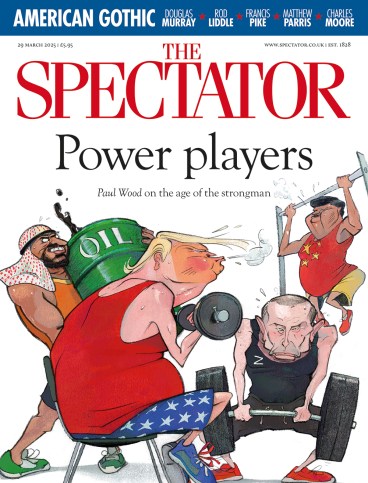
Rachel Reeves may not be the most mellifluous writer ever to inhabit 11 Downing Street. At the weekend, she informed readers of the Mail on Sunday that she would ‘make no apology for keeping an iron grip on the country’s finances’ but was happy to spend money on training more ‘brickies, sparkies and chippies’. The lurch from cliché to fake colloquialism does not suggest Reeves will be bracketed with Disraeli, Gladstone, Churchill or Lawson. But there is one addition to the political lexicon for which Reeves is responsible and which deserves a revival – ‘securonomics’.
Before Labour’s election, the term was never far from Reeves’s lips. Launched with great fanfare in Washington, it was defined in her Mais lecture last year as ‘not the big state but the smart and strategic state’ – an attempt, inspired by Joe Biden, to use government spending to leverage long-term investment in domestic production. It was a response to a world in which globalisation was in retreat, the neo-liberal economic settlement of the Blair years was no longer viable, and a new growth strategy based on improving domestic productivity was required. It offered hope of a thoughtful response to a world in which, after Covid and the Russian invasion of Ukraine, resilience, re-shoring and re-industrialisation were newly important.
Once Reeves made it into No. 11, ‘securonomics’ disappeared. Instead of developing a coherent new political economy, the Chancellor politicised every economic argument. Attacks on the ‘£22 billion black hole’ the Conservatives allegedly left in the public finances replaced arguments about appropriate reforms in a more dangerous world. The work of economists such as Andy Haldane, Paul Collier and Dani Rodrik offered any left-of-centre chancellor the arguments to rebuild the country’s productive capacity and rebalance growth across the nation. Instead, Reeves defaulted to indulging public sector pay demands and inflicting on the private sector hackneyed Treasury revenue-raisers. Train drivers lucked out as businesses faced national insurance increases.
But now ‘Securonomics’ is back. Even if Reeves did not use the words on Wednesday, the underlying message of the Spring Statement was clear: ‘The world has changed’, and spending now needs to be redirected to strengthening the nation’s security and growing our defence industrial base.
The need for such a turn was clear well before President Donald Trump’s election. Russia’s aggression, China’s ambition and Islamist atrocities had already provided cause for increased defence spending while Reeves was in opposition. Rishi Sunak had committed to growing the defence budget before the election, which Reeves failed to match.
At least now, in the spirit of her favourite singer, Sabrina Carpenter, Reeves has her ‘Eyes Wide Open’. But while the belated commitment to enhancing defence expenditure is welcome, the announced increases are barely sufficient to bridge the gap between our defence commitments and capabilities.
The increase must be viewed through the lens of the Ministry of Defence’s procurement problems. A 2021 report found that out of its 20 largest projects, 13 were running late by a total of 21 years. Multi-billion-pound disasters, such as the Ajax armoured vehicle, notorious for damaging its occupants’ hearing through excessive vibrations, leave little confidence that more good money will not follow bad into the ministry’s gaping maw.
Harnessing a spirit of innovation is essential for the PM’s ‘coalition of the willing’ to be more than a pipe dream
Labour’s long-awaited defence review will provide greater clarity as to what this government believes Britain’s international role should be and an opportunity to support innovation and strengthen industrial resilience. Developments across the Atlantic should serve as a source of inspiration rather than anxiety. There could be a British version of Anduril, the defence company established by Silicon Valley entrepreneur Palmer Luckey, which specialises in drones and
military artificial intelligence products. Both have proved as revolutionary in Ukraine as the tank did in the first world war.
Harnessing a similar spirit of innovation is essential if the PM’s ‘coalition of the willing’ is to be anything more than a pipe dream. In our new age of strongmen, the tendency of successive governments to speak loudly about Britain’s global role while carrying a very small stick is inadequate. However the government chooses to spend its bolstered defence budget, it must aim to match our ambitions to the ability to pay for them.
Repeatedly, Starmer and Reeves have placed upping Britain’s woeful growth rate at the heart of their ambitions. But the Spring Statement made clear that their course is towards further stagnation. If security begins at home, then ‘securonomics’ should provide a reason to look again at those aspects of Labour’s agenda – like the national insurance rise and the Employment Rights Bill – that are antithetical to that ambition. Instead they should use this crisis as an opportunity to re-engineer our military-industrial sector.







Comments